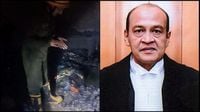In a significant development within India’s judiciary, Chief Justice of India (CJI) Sanjiv Khanna has sought the resignation of Justice Yashwant Varma following an inquiry that substantiated allegations of cash being found at Varma's residence. Despite this request, Justice Varma has refused to step down, leading to further scrutiny of the situation.
On May 8, 2025, the CJI forwarded the findings of a three-member inquiry panel to both President Droupadi Murmu and Prime Minister Narendra Modi. The panel was set up on March 22, 2025, after reports emerged of burnt cash discovered at Justice Varma's home following a fire incident on March 14. Justice Varma had been transferred from the Delhi High Court just days prior, on March 20, and took his oath as a judge at the Allahabad High Court on April 5.
The inquiry committee, comprising Justice Sheel Nagu, Chief Justice of the High Court of Punjab & Haryana, Justice G S Sandhawalia, Chief Justice of the High Court of Himachal Pradesh, and Justice Anu Sivaraman from the High Court of Karnataka, was tasked with investigating the allegations of corruption against Varma.
In a statement released by the Supreme Court, it was noted that CJI Khanna had written to the President and Prime Minister, enclosing the committee's report dated May 3, 2025, along with Justice Varma's response dated May 6, 2025. The report confirmed the presence of cash at Varma's residence during the fire incident, raising serious concerns about his conduct.
According to sources, Justice Varma was given the option to resign. If he chose not to, it was indicated that the process of impeachment might need to be initiated. Impeachment is a formal procedure outlined in Article 124(4) of the Constitution of India, which allows for the removal of a judge for proven misbehavior or incapacity.
Justice Varma was reportedly given until the end of the week to respond to the findings of the inquiry report. Sources close to the situation revealed that CJI Khanna, who is set to retire next week, aimed to resolve the matter before he demits office.
The inquiry process followed by the Supreme Court is confidential and is designed to ensure that complaints against judges are examined seriously and impartially by senior judges, without the need for a public trial.
The cash recovery allegations have raised eyebrows within legal circles, as they could undermine public trust in the judiciary. The implications of this inquiry extend beyond Justice Varma, as they may affect perceptions of integrity within the entire judicial system.
As the situation unfolds, many are watching closely to see how the government and judicial authorities will handle the potential fallout. The inquiry not only highlights issues of personal conduct among judges but also raises broader questions about accountability and transparency within the judiciary.
Justice Varma's refusal to resign could lead to a significant legal and political battle, especially if impeachment proceedings are initiated. Such a move would require a substantial political consensus, given the serious nature of the allegations and the potential impact on the judiciary's reputation.
In a climate where public trust in institutions is paramount, the outcome of this inquiry could have lasting consequences for the judiciary's credibility. Observers are keen to see how this situation will evolve and what measures, if any, will be taken to restore confidence in the judicial system.
The Chief Justice's decision to forward the inquiry report to the highest levels of government indicates the seriousness with which these allegations are being treated. It also reflects a commitment to uphold the integrity of the judiciary, even in the face of challenging circumstances.
As this case progresses, it serves as a reminder of the critical importance of maintaining ethical standards within the judiciary, ensuring that justice is not only done but is also seen to be done. The judiciary's ability to self-regulate and address allegations of misconduct will be closely scrutinized in the coming weeks.
In summary, the inquiry into Justice Yashwant Varma's conduct has opened a significant chapter in India's legal landscape, one that will test the resilience of the judicial system and its commitment to accountability.




